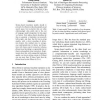Free Online Productivity Tools
i2Speak
i2Symbol
i2OCR
iTex2Img
iWeb2Print
iWeb2Shot
i2Type
iPdf2Split
iPdf2Merge
i2Bopomofo
i2Arabic
i2Style
i2Image
i2PDF
iLatex2Rtf
Sci2ools
EMNLP
2010
2010
Efficient Incremental Decoding for Tree-to-String Translation
Syntax-based translation models should in principle be efficient with polynomially-sized search space, but in practice they are often embarassingly slow, partly due to the cost of language model integration. In this paper we borrow from phrase-based decoding the idea to generate a translation incrementally left-to-right, and show that for tree-to-string models, with a clever encoding of derivation history, this method runs in averagecase polynomial-time in theory, and lineartime with beam search in practice (whereas phrase-based decoding is exponential-time in theory and quadratic-time in practice). Experiments show that, with comparable translation quality, our tree-to-string system (in Python) can run more than 30 times faster than the phrase-based system Moses (in C++).
EMNLP 2010 | Language Model Integration | Natural Language Processing | Polynomially-sized Search Space | Syntax-based Translation Models |
| Added | 11 Feb 2011 |
| Updated | 11 Feb 2011 |
| Type | Journal |
| Year | 2010 |
| Where | EMNLP |
| Authors | Liang Huang, Haitao Mi |
Comments (0)

